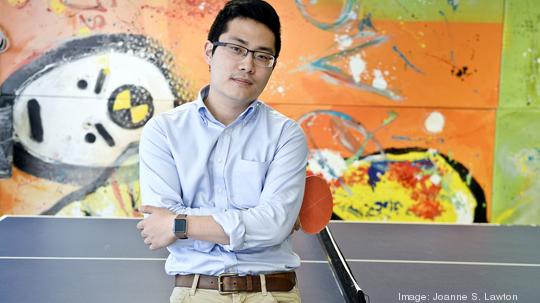
D.C.’s FiscalNote Inc. is preparing to go public during the first quarter of 2022 — in other words, any day now.
And once that happens — via a merger with blank-check company Duddell Street Acquisition Corp. (NASDAQ: DSAC) — founder and CEO Tim Hwang is targeting faster and more aggressive growth. “The business is at a scale now where we want to get it to a quarter billion, a half a billion plus in revenue as soon as possible,” Hwang said in an interview.
That’s a major jump from where the legal and regulatory dashboard company is now. The firm was targeting $108 million in revenue for 2021; it hasn’t yet released earnings for the fourth quarter and full 2021, but Duddell Street's filings indicate that FiscalNote generated $58.45 million in the first nine months of this year, while its net loss more than doubled year-over-year in that period to top $88 million. The company is aiming high, though, for $256 million in revenue in 2023, the year FiscalNote is targeting profitability. And within a few years after that? Hwang pegs its revenue intake at $400 million. The blank-check merger values FiscalNote at $1.3 billion, the company says.
“A lot of people ask me, ‘How does it feel to get to the public markets?’ As if it’s the ending, or a finish line,” Hwang said. But, he noted, many tech giants like Amazon.com Inc. (NASDAQ: AMZN) and Tesla Inc. (NASDAQ: TSLA) went public with much smaller valuations than they have now. “So, in many ways the public markets [are] just the beginning of the growth story for a lot of these technology organizations.”
Half of FiscalNote's growth will come through acquisitions, according to Hwang’s current plan, which is why the company is entering the public markets now. That M&A strategy "does require a liquid currency," Hwang said — per Duddell Street's filings, FiscalNote holds $35.7 million in cash and equivalents, compared with $44.2 million at the end of 2020 and $6.3 million at the end of 2019.
“Because we need to be able to conduct M&A transactions in a very targeted fashion that’s attractive to a number of different private equity players, founders who are trying to sell their businesses, … the ability to access that particular capability was particularly interesting.”
The company’s M&A has ratcheted up in the past year. By the Washington Business Journal’s count, FiscalNote made 11 acquisitions in 2021 alone, helped along by a massive $160 million raise in December 2020. Most recently, it acquired Seoul’s Aicel Technologies, and fellow D.C. companies Frontier Strategy Group LLC. The company also famously purchased CQ Roll Call in an $180 million deal in 2018.
The other half of the growth will be organic, Hwang said. That means using proceeds from the public offering to make investments in new content and workflow capabilities and scaling up the product and sales teams. The company has around 700 employees now, according to the CEO, up from 650 in October and 450 employees just two years ago.
Hwang said he’s not targeting a specific number of hires for 2022 yet. Instead, the company is planning in 90-day “sprint” cycles, which he attributed to going public. “I think we’re taking a more agile approach to hiring right now,” he said. Given the Great Resignation and extreme competition for tech workers, FiscalNote is letting employees choose to be permanently remote.
While Hwang would prefer that employees are based in specific locations, he no longer feels the talent market allows for that kind of rigidity. “Things have changed,” over the last 18 months, he said.
Once it goes public, FiscalNote will trade on the Nasdaq stock exchange under the ticker symbol “NOTE.” The 9-year-old company has been attempting to make its way toward a public debut for years, but that path hasn’t always been smooth, particularly in 2019 as it contended with a potential cash crunch and integration of its CQ Roll Call business, according to sources close to the company at that time. In 2020, Hwang expected FiscalNote to become profitable that same year, a target that has since been pushed back.
When the transaction with Duddell Street closes, Hwang, 29, said he expects to be the youngest Asian American CEO on a major U.S. stock exchang. Hwang said he hopes to help create more of a pipeline for other Asian American entrepreneurs. “Recently, I’ve been doing a lot of angel investing and mentoring for younger startups,” Hwang said. “I’m still young today, but as I get older, it’s something I hope I can spend more time on.”



